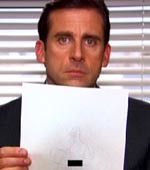Reveille and NBC Universal Television Studios' 2006 Emmy award-winning show, The Office, proved its writers know something about life, comedy, and crisis communication.
Last Thursday's episode, "Product Recall," put Michael Scott (Steve Carell), regional manager of Dunder-Mifflin in crisis after a disgruntled employee at the paper mill put an obscene watermark on one of their most popular paper products. The paper was shipped to clients, including a local high school that used it for prom invitations.
Employing "pat" crisis communication techniques, Scott assembles a crisis team with Dwight Schrute (Rainn Wilson) in charge of a press conference. The thinking here is to always run to a crisis rather than from it. It's better to let the press know, Scott deduces, then to let them find out on their own.
Fortunately for Scott, Schrute is unsuccessful at securing CNN and other major news networks to cover the obscene paper problem. Unfortunately for him, a reporter from the Scranton Times does attend.
From here, it goes from bad to worse. Scott's idea for the press conference is to offer restitution to a major client in the form of free paper voucher (a "big" photo op check) and then spin the scandal into a "local company makes good with clients" story.
Instead, the client rejects the offer and demands Scott's resignation. Scott responds by kicking her out of the press conference and telling her to call the “Ungrateful Beeyotch Hotline.”
Realizing the Scranton Times might write a less than favorable recap, Scott makes an apology video that concludes his resignation is not an option and it would take a S.W.A.T. team to remove him from Dunder-Mifflin. (A few more minutes and the writers might have added that Scott could post the video on YouTube.)
This is really funny stuff. It might be even funnier if companies, armed with "pat" crisis communication plans, do not make similar mistakes.
In this case, Scott would have been better off being prepared for the press, but not begging for attention. (If the problem was life-threatening, it would be different.) Sometimes the best coverage of a crisis is no coverage at all.
Of course, had he not made a molehill into a mountain by hosting a press conference and inviting an unconfirmed client "ally," then there would have been no show last Thursday to make us smile.
You can find a quick recap of this misapplied Dunder-Mifflin approach to crisis communication by visiting the The Office Web site.

Last Thursday's episode, "Product Recall," put Michael Scott (Steve Carell), regional manager of Dunder-Mifflin in crisis after a disgruntled employee at the paper mill put an obscene watermark on one of their most popular paper products. The paper was shipped to clients, including a local high school that used it for prom invitations.
Employing "pat" crisis communication techniques, Scott assembles a crisis team with Dwight Schrute (Rainn Wilson) in charge of a press conference. The thinking here is to always run to a crisis rather than from it. It's better to let the press know, Scott deduces, then to let them find out on their own.
Fortunately for Scott, Schrute is unsuccessful at securing CNN and other major news networks to cover the obscene paper problem. Unfortunately for him, a reporter from the Scranton Times does attend.
From here, it goes from bad to worse. Scott's idea for the press conference is to offer restitution to a major client in the form of free paper voucher (a "big" photo op check) and then spin the scandal into a "local company makes good with clients" story.
Instead, the client rejects the offer and demands Scott's resignation. Scott responds by kicking her out of the press conference and telling her to call the “Ungrateful Beeyotch Hotline.”
Realizing the Scranton Times might write a less than favorable recap, Scott makes an apology video that concludes his resignation is not an option and it would take a S.W.A.T. team to remove him from Dunder-Mifflin. (A few more minutes and the writers might have added that Scott could post the video on YouTube.)
This is really funny stuff. It might be even funnier if companies, armed with "pat" crisis communication plans, do not make similar mistakes.
In this case, Scott would have been better off being prepared for the press, but not begging for attention. (If the problem was life-threatening, it would be different.) Sometimes the best coverage of a crisis is no coverage at all.
Of course, had he not made a molehill into a mountain by hosting a press conference and inviting an unconfirmed client "ally," then there would have been no show last Thursday to make us smile.
You can find a quick recap of this misapplied Dunder-Mifflin approach to crisis communication by visiting the The Office Web site.
















